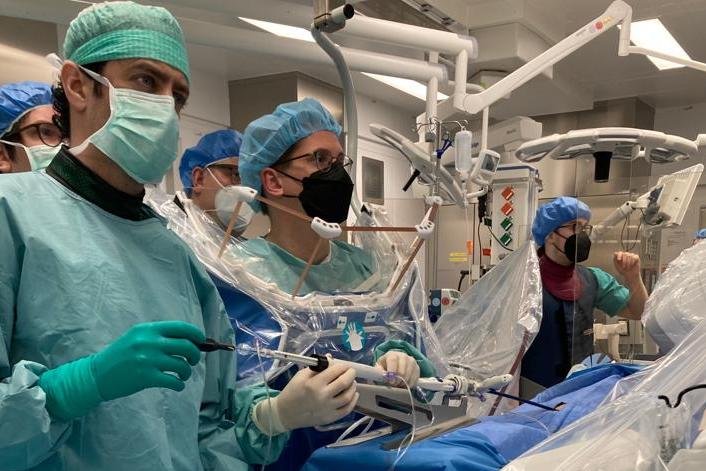
(Vienna, 24 May 2022) In a complex procedure, a team from the Department of Cardiac Surgery at MedUni Vienna and University Hospital Vienna has, for the first time, successfully inserted a novel implant for treating tricuspid valve regurgitation via a single access on one side of the groin. Tricuspid valve leakage is one of the most common valvular heart diseases. This causes blood to flow back into the right atrium and the vena cava, which manifests itself in water retention in the legs and abdomen, congested neck veins, as well as a drop in overall performance and shortness of breath.
Approximately 90% of leaks in the tricuspid valve position are due to significant dilatation of the valve leaflet. A new implant has been developed to treat this very mechanism: the Cardioband is anchored into the valve annulus with the aid of precise apparatus using 17 screws. At University Hospital Vienna, this innovative prosthesis was recently implanted into a patient for the first time. The procedure was so successful that heart valve regurgitation was reduced by more than half and the patient is once again able to lead a largely normal life. "Especially given the advanced stage of tricuspid regurgitation and the patient's age, implanting the Cardioband was the only viable treatment option," clarifies surgeon Martin Andreas from the Department of Cardiac Surgery at MedUni Vienna and University Hospital Vienna.
Interdisciplinary heart team
Martin Andreas performed the complex operation together with Markus Mach, Iuliana Coti (all from Department of Cardiac Surgery) and cardiologist Georg Goliasch (Department of Medicine II) under the continuous cardiac ultrasound-targeted guidance of anaesthetist Anna Bartunek (Division of Cardiothoracic and Vascular Anesthesia and Intensive Care Medicine). "This case underscores the importance of an interdisciplinary team from cardiac surgery, cardiology and anaesthesia. It is only in this way that novel implants and resources can be used in the future to continue optimising treatments for patients in the long term," emphasises Martin Andreas.
Another minimally invasive treatment option
Thanks to meticulous research in the field of interventional and minimally invasive treatment of tricuspid regurgitation and mitral regurgitation, the Cardioband adds another minimally invasive option for treating valvular heart disease to the Department of Cardiac Surgery's repertoire.